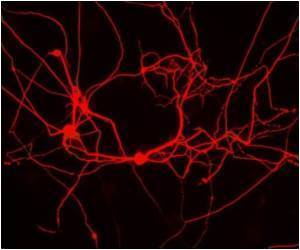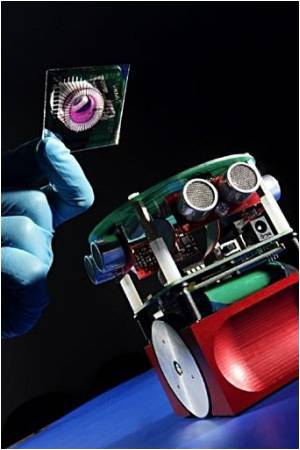Stephen Hawking, a British astrophysicist is likely to be the world's most famous person living with amyotrophic lateral sclerosis (ALS), also known as Lou Gehrig's disease.

A new principle on motor neuron death
The IMBA scientists, working with an international team of researchers under the leadership of Josef Penninger and Javier Martinez, discovered a completely new fundamental mechanism that triggers the death of motor neurons. Motor neurons are nerve cells responsible for stimulating muscles. The loss of these motor neurons in mice with a genetic mutation in a gene named CLP11 leads to severe and progressive muscular paralysis and, in some cases, to death.
"We've been working on resolving the function of the CLP1 gene in a living organism for a long time. To do that, we developed model mice in which the function of CLP1 was genetically inactivated. To our utter surprise we discovered that deactivating CLP1 increases the sensitivity of cell die when exposed to oxidative stress2. That leads to enhanced activity of the p53 protein3 and then to the permanent destruction of motor neurons," says Toshikatsu Hanada, a postdoctoral researcher working in the lab of Josef Penninger and first author of the study along with Stefan Weitzer.
Stephen Hawking - a most renowned patient: Motor neuron diseases (MNDs), such as amyotrophic lateral sclerosis (ALS) and spinal muscular atrophy (SMA), are chronic disorders of the neuromuscular system. These diseases are caused by damage in the motor nerve cells in the brain and spinal cord, and the nerves can no longer stimulate motion in the muscles. The primary symptoms are muscular weakness, muscular dystrophy, and problems swallowing or speaking. Stephen Hawking was diagnosed with ALS 50 years ago. But not all ALS patients live so long with the disease: so far there are no treatments for ALS. Nearly all ALS patients die of paralysis of respiratory muscles within a few years.
Completely new disease mechanism: Javier Martinez, an IMBA team leader and co-author of the study, is a specialist in the field of ribonucleic acid (RNA) research. His research group had discovered the CLP1 gene in an earlier study, published in Nature in 2007. Until now, the exact essential function of CLP1 in RNA biology was unclear. "By deactivating CLP1, we have discovered a previously unknown new species of RNA," says Javier Martinez about the scientific relevance of the work. "The accumulation of this RNA is a consequence of increased oxidative stress in the cell. We see this as one of the triggers for the loss of motor neurons that occurs in ALS and other neuromuscular diseases. Thus our findings describe a completely new mechanism of motor neuron diseases."
Seminal findings
Josef Penninger, scientific director at the IMBA and last-author of the study, is excited about the researchers findings: "This surprising discovery of a role of CLP1 in the onset of motor neuron diseases is an entirely new principle in how RNA talks to oxidative stress. Nearly all genetic mutations found in ALS patients affect either RNA metabolism or oxidative stress, suggesting a possibly unifying principle for these diseases. Our work may have revealed the ''missing link'' in how these two biological systems communicate and trigger incurable diseases like ALS."
Stefan Weitzer sees tremendous potential for these findings: "We've discovered a new mechanism that leads to the death of motor neurons. If this holds true for other neuronal disease, our results could be one day used to drive the development of treatments for previously incurable diseases. In our work we also describe how the p53 protein regulates the loss of motor neurons. Removing p53 saves mice with CLP1 mutations from certain death." If scientists are successful in applying these findings to people, the researchers may have discovered a treatment approach to cure ALS and similar diseases. The authors, however, caution that more studies will be needed to translate their findings to human medicine.
Advertisement
Their work, "The RNA kinase CLP1 links tRNA metabolism to progressive motor-neuron loss", was published online today, 10 March 2013, in the renowned journal "Nature". DOI: 10.1038/nature11923
Advertisement
1) CLP1: = Cleavage and Polyadenylation Factor 1: a kinase (enzyme responsible for transmitting signals in cells) responsible for attaching phosphate residue to RNA.
2) Oxidative stress: causes damage to cells and the genome, and is involved in the ageing process. The normal repair and detoxification function of the cells is overburdened.
3) p53: a protein that is mutated in many types of cancer cells. It plays a role in inhibiting the cell cycle and can trigger cell death.
Toshikatsu Hanada received his PhD at Oita University and conducted research in immunology at Kyushu University, both in Japan. In 2005 he began post-doctoral research in the laboratory of Josef Penninger, where he developed genetic disease models. In 2012, he became an associate professor at Kyoto University in Japan.
Stefan Weitzer studied microbiology at the University of Vienna. As part of his dissertation he conducted research at Cancer Research UK (CRUK) in London. Since 2004 he is a postdoctoral fellow in the laboratory of Javier Martinez, exploring the functions of RNA-processing proteins.
Javier Martinez Born in Argentina in 1965, Martinez received his PhD in biology in Buenos Aires, and went on to conduct research at the University of Uppsala in Sweden, the Max Planck Institute for Biophysical Chemistry in GAttingen, Germany, as well as at Rockefeller University in New York. He has been a team leader at the IMBA since 2004 and specializes in researching the biochemistry and biology of RNA molecules in mammalian cells.
Josef Penninger
Since 2002 the Austrian geneticist is the scientific director at IMBA. The approach of his group is to genetically manipulate and change genes, trying to establish basic principles of the development and basic mechanisms of disease pathogenesis. He focuses on heart and lung diseases, autoimmune diseases and cancer as well as bone metabolism. Josef Penninger has received various prizes and honors, such as the EU Excellence Award (2004), Young Global Leader elected by the World Economic Forum (2005), Ernst Jung Prize for Medicine (2007), Descartes Prize (highest EU research prize, 2007), Carus Medal (2008), he was elected a Fellow of the American Association for the Advancement of Science (2011) and recently received the 7.4 Mill $ Innovator Award by Era of Hope/US Department of Defense (2012).
IMBA:
The Institute of Molecular Biotechnology of the Austrian Academy of Sciences (IMBA) combines fundamental and applied research in the field of biomedicine. Interdisciplinary research groups use functional genetics to explore mechanisms of disease and basic physiology. IMBA is a subsidiary of the Austrian Academy of Sciences, the leading organization promoting non-university academic basic research in Austria. In 2012, IMBA was voted as second to top international workplace for postdoctoral researchers, by readers of the US based life sciences magazine, The Scientist. www.imba.oeaw.ac.at
Austrian Academy of Sciences (A–AW):
Within the Austrian Academy of Sciences, renowned researchers from more than 60 research institutions have formed a comprehensive knowledge pool covering a wide array of disciplines for the sake of progress in science as a whole. All of the Academy's activities are closely networked at national, EU, and international level with university and non-university partners.
Source-Newswise









